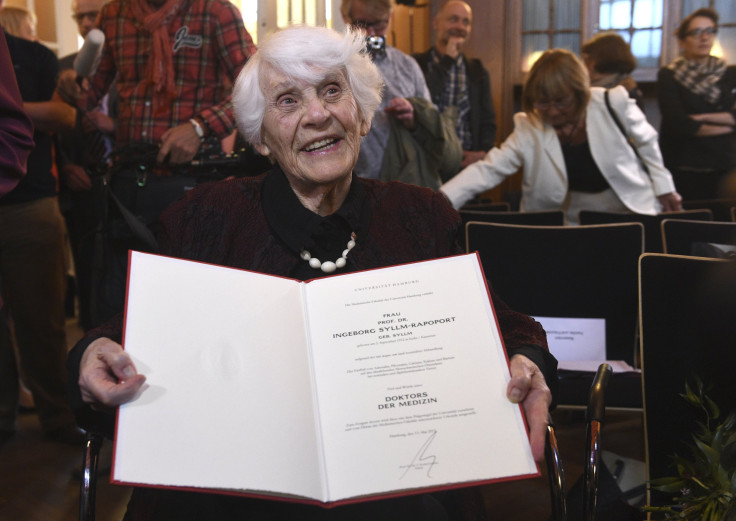Ingeborg Syllm-Rapoport, 102-Year-Old German Woman, Awarded Doctorate Denied By Nazis

Ingeborg Syllm-Rapoport, a 102-year-old German woman, received her doctorate Tuesday, 77 years after it was denied by the Nazi regime because of her part-Jewish background. The University of Hamburg awarded her the Ph.D., making her the oldest doctorate recipient in Germany.
Syllm-Rapoport, a retired neonatologist, whose father was a Protestant while her mother was Jewish, had completed her doctoral thesis on diphtheria in 1938. However, the Nazis' anti-Jewish laws barred her from giving an oral exam, prompting her supervisor, Rudolf Degkwitz, to write in a letter that he would have accepted her work but for the race laws, which made “it impossible to allow Miss Syllm's admission for the doctorate," the Associated Press reported.
Burkhard Goeke, medical director of the University of Hamburg's hospital, said, in a speech: "After almost 80 years, it was possible to restore some extent of justice," according to AP. "We cannot undo injustices that have been committed, but our insights into the past shape our perspective for the future."
In her acceptance speech Tuesday, Syllm-Rapoport said she went to the trouble of getting the doctorate degree at her age to honor those who suffered injustice during the Third Reich.
"For me personally, the degree didn't mean anything, but to support the great goal of coming to terms with history — I wanted to be part of that," Syllm-Rapoport reportedly told German public television station NDR, according to AP.
Syllm-Rapoport moved to the United States in 1938 and graduated from the Women’s Medical College of Pennsylvania in Philadelphia, the Wall Street Journal reported. She began working as a neonatologist at a Cincinnati hospital where she was promoted to head the pediatric polyclinic department.
She later moved to communist East Berlin and worked as a pediatrician. She then became a paediatrics professor, holding Europe's first chair in neonatal medicine, at the renowned Charite hospital in East Berlin, reported BBC. She was also given a national award for her work in considerably reducing infant mortality in East Germany.
© Copyright IBTimes 2024. All rights reserved.






















